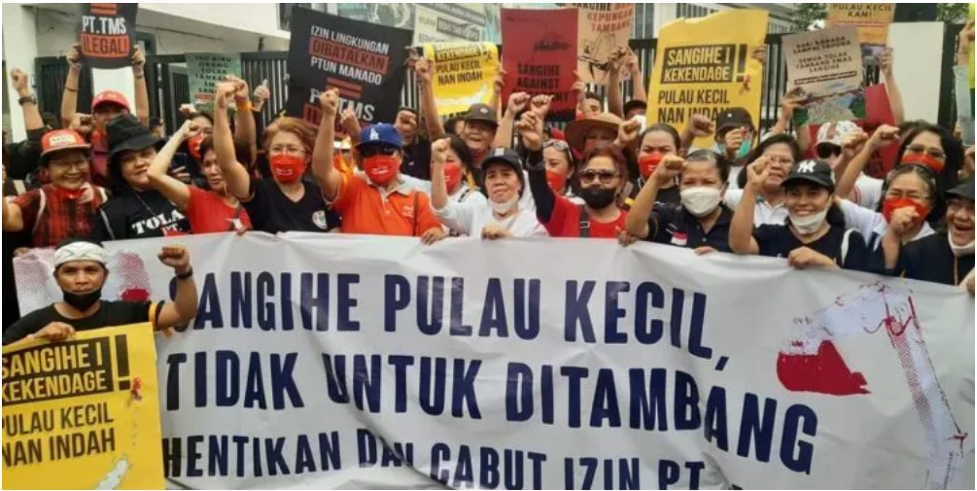The struggle to protect the small 736 square-kilometre Island of Sangihe from industrial gold mining by Canada’s Baru Gold Corp. (Baru) continues to play out through public demonstrations of opposition to the project by Sangihe islanders and the Save Sangihe Island Association (SSI), both on the island and in the capital Jakarta, but also through the courts. Baru seeks to develop an open-pit heap leach gold mine on Sangihe Island through its wholly-owned subsidiary Sangihe Gold Corporation, which owns 70% of PT Tambang Mas Sangihe (TMS). Two recent Supreme Court of Indonesia decisions are important in this regard.
Background - On June 2, 2022, a case was won by 56 women from Bawone and Binebas villages in Baru’s concession. The case questioned the legality of an Environmental Permit issued by North Sulawesi Provincial authorities. Another case, brought by Sangihe Islanders in October 2021, challenged the issuance of an Increase in the Production Operations Stage of the Contract of Work issued by the Minister for Energy and Mineral Resources on January 29, 2021.
Recent Supreme Court decisions - On December 22, 2022, the Supreme Court overturned the lower court’s decision that had ruled in favour of the challenge to the Environmental Permit brought by the 56 women from Bawone and Binebas. However, on January 12, 2023, the Supreme Court issued a decision (Putusan Kasasi Mahkamah Agung RI Nomor : 650 K/TUN/2022) cancelling Baru’s Increase in the Production Operations Stage of the Contract of Work, or its “Operational Permit.”
The Environmental Permit covers an area of 65.48 hectares out of an overall concession area of 42,000 hectares (420 sq. km.) covered under the Operational Permit, granted by the Decree of the Minister of Energy and Mineral Resources, which now has been ordered revoked by the Supreme Court decision of January 12, 2023. Lawyers for SSI point out that the cancellation of the Operation Permit overrides all other permits, including the Environmental Permit.
One of the laws that the Supreme Court maintains was breached by the issuance of an Operation Permit concerns provisions under the Management of Coasts and Small Islands.1 Sangihe island is only 736 sq. km, and is classified under Indonesian law as a small island and, as such, is off limits to mineral exploitation, which is prohibited on islands of less than 2,000 sq. km.2
Baru Gold’s CEO, Terry Filbert, has stated that the company will apply for a new operation permit. He argues that PT TMS was established by a notarial deed dated July 24th, 1996 and ratified by Decree of the Minister of Justice (C2-2952.HT.01.01.TH.97) on April 23rd, 1997. He also notes that the company has a valid Contract of Work that was signed on April 28th, 1997 and pre-dates laws referenced by the Supreme Court in its revocation of the operation permit, including the law banning mining activity on small islands. Filbert maintains that the company will continue its operations on Sangihe and expects to produce gold in 2023.3
SSI, however, maintain that article 169 of Constitution Law 4/2009 made it mandatory for all Contracts of Work issued by the Indonesian Government previous to that 2009 Law to be adjusted to existing law. Furthermore, Article 1320 of the Civil Law Code states that a contract which is contrary to existing laws, or has not been adapted to comply with them, is an unlawful contract and must be canceled by law. SSI argue that the PT TMS’s Contract of Work was dormant for more than a decade and that PT TMS failed to meet the requirements of article 169 of Constitution Law 4/2009.
What remains abundantly clear through the legal challenges brought by 56 village women in Baru Gold’s concession site and by other affected villagers of Sangihe Island is that Baru does not have a social license to operate.
For more information, contact Catherine Coumans at catherine@miningwatch.ca.
**
Photo: Sangihe Islanders protest the operations of Baru Gold on their small island.
1 Page 13 of the Supreme Court ruling notes that the operation permit granted to PT. TMS must be cancelled because it contradicts chapter 10 paragraph (2) letters d and e of Constitution Law 32 of 2009 concerning Protection and Environmental Management as well as violating Article 26 A point 1 of Law Number 1 of 2014 concerning Amendments to Law Number 27 of 2007 concerning Management of Coastal Zone and Small Islands.
2Constitution Law UU 1/2014) concerning the Management of Coasts and Small Islands. This law updated a previous law of 2007, which also banned mining on islands smaller than 2000 sq. km.
3Baru Gold January 17th News Release – “At this point in time, the Company does not anticipate a lengthy delay in obtaining the new Operational Permit, as the Company expects no-to-little additional work or information required to reapply. The individuals behind this attempt to impact the Company’s operations has caused no significant changes to our timeline. Drilling is anticipated shortly and is not dependent on the Operational Permit. The reissuance of the Operational Permit is expected before subsequent construction and production. The Company remains committed to gold production in 2023.”
